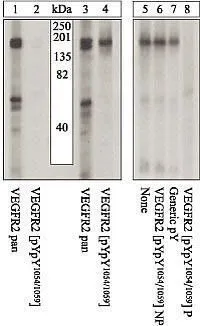VEGF Receptor 2 antibody
GTX10972
ApplicationsFlow Cytometry, Western Blot, ImmunoHistoChemistry, Neutralisation/Blocking
Product group Antibodies
TargetKdr
Overview
- SupplierGeneTex
- Product NameVEGF Receptor 2 antibody
- Delivery Days Customer9
- Application Supplier NoteWB: 0.1-0.2 microg/ml. FACS: 3-10 microg/ml. IHC: 5-15 microg/ml. Neutralizing/Inhibition: 0.1-0.3 microg/ml. *Optimal dilutions/concentrations should be determined by the researcher.Not tested in other applications.
- ApplicationsFlow Cytometry, Western Blot, ImmunoHistoChemistry, Neutralisation/Blocking
- CertificationResearch Use Only
- ClonalityPolyclonal
- ConjugateUnconjugated
- Gene ID16542
- Target nameKdr
- Target descriptionkinase insert domain protein receptor
- Target synonyms6130401C07; fetal liver kinase 1; Flk; Flk-; Flk1; Flk-1; kinase NYK; Krd-1; Ly73; orv; protein-tyrosine kinase receptor flk-1; soluble vascular endothelial growth factor receptor 2; sVEGFR-2; vascular endothelial growth factor receptor 2; vascular endothelial growth factor receptor-3; VEGF; VEGF receptor-2; VEGFR; VEGFR2; VEGFR-2
- HostGoat
- IsotypeIgG
- Scientific DescriptionVascular endothelial growth factors (VEGFs) are a family of closely related growth factors having a conserved pattern of eight cysteine residues and sharing common VEGF receptors. VEGFs stimulate the proliferation of endothelial cells, induce angiogenesis, and increase vascular permeability in both large and small vessels. The mitogenic activity of VEGFs appears to be mediated by specific VEGF receptors. Vascular Endothelial Growth Factor Receptor 2 (VEGF Receptor 2, KDR, Flk1) is one of the five receptor tyrosine kinases (RTKs) (VEGF Receptor 1/Flt1, VEGF Receptor 2/KDR/Flk1, VEGF Receptor 3/Flt4, tie1 and tek/tie2) whose expression is almost exclusively restricted to endothelial cells. These RTKs play central roles in vasculogenesis and angiogenesis. Tie1 and tek/tie2 are a class of RTKs containing two immunoglobulin-like domains, three EGF homology domains and three fibronectin type III domains in their extracellular regions. VEGF Receptor 1/Flt1, VEGF Receptor 2/KDR/Flk1, and VEGF Receptor 3/Flt4 are members of the class III subfamily of RTKs containing seven immunoglobulin-like repeats in their extracellular domains. VEGF Receptor 1 and VEGF Receptor 2 are both expressed in an endothelial cell-specific manner. They are detectable in virtually all tissues in adults and embryos. Monocytes express VEGF Receptor 1 and VEGF Receptor 2. VEGF Receptor 2 is also expressed in pancreatic duct cells, hematopoietic stem cells, megakaryocytes, specific tumor cell types such as malignant melanoma cells, and retinal progenitor cells. In the retina, two functional VEGF Receptor 2 forms are expressed as a result of alternative splicing. VEGF Receptor 2 is a key marker for pluripotent hematopoietic stem cells. VEGF Receptor 1 and VEGF Receptor 2 are closely related in their putative roles in angiogenesis. VEGF Receptor 2 is involved in commitment of endothelial-cell lineages and to cell proliferation, while VEGF Receptor 1 seems to be responsible for guiding endothelial cells into the proper spatial organization of the lumen-containing vessels. VEGF Receptor 1 binds both PIGF and VEGF with high affinity, whereas VEGF Receptor 2 binds VEGF with high affinity but does not bind PIGF. Recombinant soluble VEGF Receptor 2/Fc chimera binds VEGF with high affinity and is a potent VEGF antagonist.
- Storage Instruction-20°C or -80°C,2°C to 8°C
- UNSPSC12352203
References
- Self-implantable double-layered micro-drug-reservoirs for efficient and controlled ocular drug delivery. Than A et al., 2018 Nov 6, Nat CommunRead more

![WB analysis of purified VEGF Receptor 2 recombinant protein using GTX14094 VEGF Receptor 2 antibody [DC101]. Lane 1 : 1 ug non-reduced purified mouse VEGER-2 Lane 2 : 0.19 ug non-reduced purified mouse VEGFR-2 Dilution : 6 ug/ml (Lane 1) or 12 ug/ml(Lane 2)](https://www.genetex.com/upload/website/prouct_img/normal/GTX14094/GTX14094_20200917_WB_w_23060620_522.webp)


![FACS analysis of bEnd-3 cells using GTX01498-11 VEGF Receptor 2 antibody [Avas12a1] (PerCP-Cy5.5). Solid lone : primary antibody Dashed line : isotype control antibody amount : 0.5 microg (5 microl)](https://www.genetex.com/upload/website/prouct_img/normal/GTX01498-11/GTX01498-11_20200428_FACS167_w_23053121_535.webp)
![IHC-P analysis of formalin fixed mouse kidney tissue sections using GTX53094 VEGF Receptor 2 antibody [6C23].](https://www.genetex.com/upload/website/prouct_img/normal/GTX53094/GTX53094_20191119_IHC-P_w_23060900_802.webp)
![Mouse endothelial cells, pre-incubated with GTX53463 VEGF Receptor 2 antibody [MAB0701] for 20min, were stimulated with murine VEGF for 20 mins and then the level of p-VEGFR2 was detected using anti-phospho-VEGF2 (Y1175).](https://www.genetex.com/upload/website/prouct_img/normal/GTX53463/GTX53463_20191119_Inhibition-assay_w_23060900_211.webp)